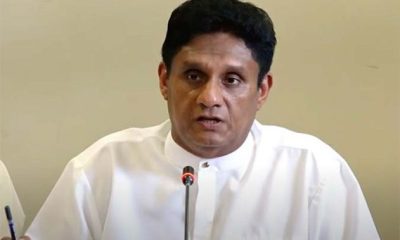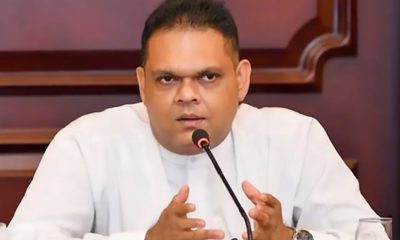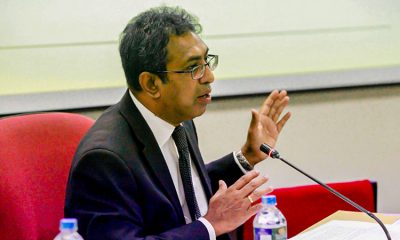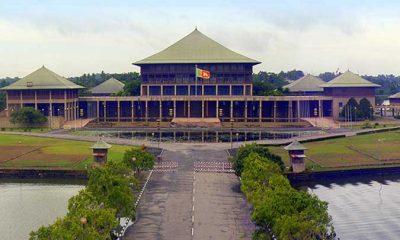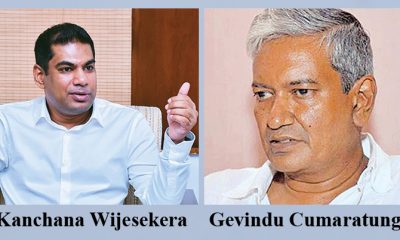Features
Sir John takes over, cabinet meeting at N’Eliya and the EL Senanayake election case

(Excerpted from Memoirs of a Cabinet Secretary by BP Peiris)
The first meeting of the new Cabinet placed on record its appreciation of the services rendered to the country by Mr Dudley Senanayake. Sir Kanthiah Vaithianathan, who had resigned his post as Permanent Secretary to the Ministry of Defence and External Affairs, took over the Portfolio of Housing and Social Services.
Sir John was spending a few days in December 1953 at his official residence, The Lodge, Nuwara Eliya. More out of mischief than on grounds of urgency, he summoned the Cabinet to meet at The Lodge on December 31. On the New Year Day following, A. G. Ranasinha, the Secretary, was to receive the honour of knighthood, and I, the O.B.E., and we found the arrangement very inconvenient, but had to obey orders and attend the meeting.
We accordingly travelled to Nanu Oya by the night train on the 30th with office peons and Cabinet security boxes. On reaching our destination early next morning at about six, we found Police cars waiting for us on Sir John’s instructions. On our reaching The Lodge, the cook, Periasamy, was there to greet us, again on Sir John’s orders, with egg hoppers and fish curry, which was most welcome. Sir John was asleep but had given his orders with military precision.
We soon got ready and the meeting started rather early at about 9 a.m. At 11 a.m. drinks were served. Every possible brand of liquor was laid out on a side table, and we were asked to help ourselves. At 1 p.m. there was a short adjournment for lunch, preceded by a few more drinks. An excellent lunch, of mulligatawny, yellow rice and chicken curry was provided by the cook. The meeting terminated early afternoon and we had to while away the time till 5 p.m., when Lord Soulbury had invited us to tea.
Some Ministers preferred to walk on the well-trimmed lawns. Sir John, Bulankulame Dissawa, M. D. Banda, and I were in the sitting room, warming ourselves by the fire when Sir John asked me, “I say, Peiris, aren’t you getting something tomorrow?” The recommendation for the honour is made by the Prime Minister, but the letter inquiring whether I would accept the honour comes from Queen’s House marked ‘Top Secret’.
I therefore replied “I know nothing about it, Sir”, and Sir John told the other Ministers “Look at this chap; I recommend him for the honour and he thinks it is a Cabinet secret and wants to hide it from me. Anyway, I’ll be at your house at 7 p.m. Don’t give lime juice.”
We took the night train back, travelling to Nanu Oya again in Police cars. It was a bit of a rush because the Mayor, Mr Vijayaratnasingham, had a cocktail party in our honour and Ranasinha and I were worried that we would miss our train. Sir John had seen to it that baskets of flowers were put into our cars. True to his word, the Pilot car preceding the Prime Minister’s car turned in at my gate sharp at seven the next evening. He had two whiskeys and was off to be in time at the next place because mine was not the only house of ‘honours’ men he visited that evening.
He was surprised when I asked him in French whether to sing him a French song. He said “Oui, oui, oui” and asked who was going to play. I sat at the piano and, with Sir John standing by me with his glass in his hand, sang a naughty song which Maurice Chevalier used to sing at the Moulin Rouge in Paris in the early thirties, and the words of which no one but Sir John understood. When I was getting to the end of the chorus, he whispered in my ear “Sing the chorus again.” The first line of the chorus was “Dites moi, ma mere, dites moi ma mere pourquoi less chiens daps les rues se months dessous”.
One of the first major questions which the Prime Minister asked his Cabinet to consider was that of bribery and corruption. He was determined, if possible, to stamp this moral stain out of public life. A new law was drafted to be in operation in the first instance for 18 months and to be applicable to public servants only. Charges were to be investigated by the Criminal Investigation Department and the tribunal hearing the charges was to consist of judges or retired judges.
Power was also taken to make the new law applicable, if necessary, to the findings of a Commission appointed to investigate allegations of bribery and corruption against a Senator or Member of Parliament, and it was agreed that any fee or reward paid or given to a Senator or Member of Parliament to appear for any person before a public officer other than a judicial or quasi-judicial officer should be deemed to be a bribe. The Bill was passed into law as Act No. II of 1954, and has been amended more than once to vest additional powers in the Bribery Commissioner.
E. B. Wikramanayake, Q. C. now joined the Cabinet as Minister of Justice. He was a man of few words and did not believe in wasting his time or anyone else’s. In the course of a discussion, he made his point in the fewest possible words.
In December 1953, the Governor-General was informed that Her Majesty the Queen intended to visit Ceylon. The Cabinet considered this communication and agreed that Her Majesty should be invited to open the next Session of Parliament. The Queens’ Speech, which I was asked to make as short as possible, was approved by the Cabinet and an advance copy sent to the Palace.
On the day of Her Majesty’s arrival in Colombo, I found five lines of traffic opposite my house on the Havelock Road moving, from two in the morning, towards the city. The streets were decorated and thronged with people, rich and poor, to welcome the Royal visitors. The weather was more than kind; it was a scorching sun, and the Queen, who rode with His Royal Highness Prince )Philip in an open car had a parasol for protection.
I watched the procession from a vantage point in the Dutch Burgher Union in Bullers Road. Persons were perched on the roofs of the houses opposite. ‘The welcome accorded to the Royal couple was rousing as well as spontaneous. The impression that I had was first, that the welcome was a natural gesture of loyalty, and secondly, that, with our own monarchical background, our people just cannot resist Royalty and the pageantry that is associated with that institution.
I wonder how many persons noticed the Constitutional aspect of the Royal visit. Her Majesty was Queen of Ceylon, and, though not domiciled here, she was temporarily resident in one of Her Dominions. As such, during Her residence here, the person she had appointed to represent Her in the Island, Lord Soulbury, officially ceased to exist. The Governor-General could not have assented to a Bill nor could he have exercised the Royal prerogative of pardon. The office of the Governor-General was, for the time being, in abeyance. That is the reason for Lord Soulbury’s absence at the Opening of Parliament. In effect, he “took himself away” and stayed in the background.
Her Majesty opened the Third Session of the Second Parliament on April 12, 1954, and read Her Speech in English in a clear voice. Naturally, she could not be asked to comply, as Sir Oliver Goonetilleke did a few years later, with the requirements of our Official Language Act. At the next Cabinet meeting Ministers Vaithianathan and Natesan referred to the fact that, at the presentation of the Addresses, the speeches had been made in English and Sinhala but not in Tamil. They stated that this had caused uneasiness among the Tamil community.
I think the two Tamil Ministers, when they used the word “uneasiness”, exercised the utmost restraint in the use of language and refrained, with great dignity, in giving vent, not only to their own feelings, but to the feelings of the entire Tamil community. To make matters worse, the Prime Minister assured the Cabinet that the omission of a Speech in Tamil was accidental and not intentional, and promised to make a public statement to that effect. Really, I ask, to whom was the Prime Minister talking? To two of the intellectual Ministers in his Cabinet; and was he talking with his tongue in his cheek? Incidents like this though quickly forgotten by the Sinhalese, remain long in the memories of the minority communities as utterly insulting and unnecessary pinpricks inflicted on purpose.
On Her birthday, April 21, Her Majesty held an Investiture at Queen’s House at which A. G. Ranasinha was knighted and I was invested with the insignia of the O.B.E. A Throne had been placed on the dais for the Queen but had to be hurriedly removed a few minutes before Her Majesty’s arrival because, in England, it is customary for the Sovereign to stand throughout an Investiture. His Royal Highness stood one foot behind the Queen throughout the ceremony and looked thoroughly bored.
Immediately after the Investiture, a group photograph was taken of Her Majesty and Her Ceylon Cabinet. The seats were all arranged. The Prime Minister would naturally sit on the Queen’s right. Sir Oliver Goonetilleke wanted to sit on Her Majesty’s left but Minister J. R. Jayewardene insisted that the setting should be according to the Order of Precedence and that he should be on the Queen’s left. By his sojourn abroad, Sir Oliver had come down in the Precedence Table and, in that historic photograph, would have had to stand in the second row if one of the Ministers had not fallen ill and his place taken by an acting Minister.
It is for this reason that Sir Oliver is seen seated, not next to the Queen, but in the last chair. Was it not Pope who said that every man has just as much vanity as he wants understanding? When this squabble about seating had been settled, the Aide-de-Camp was informed that the Ministers were ready. Her Majesty arrived and took her seat. She was so dignified that the photographer did not dare to tell Her to smile or put her left foot forward; but a beautiful photograph was the result. At the end of the ceremony, Sir John, on behalf of the Cabinet, presented Her Majesty with a silver tray as a birthday present.
It was at about this time that my daughter Kamala, to the family and friends known as ‘Binkie’, married the man of her choice, Dr Cecil D. Chelliah, a specialist in the diseases of the chest. As I said before, her Kundasale training had turned out a plain living, high thinking, sensible and efficient woman. D. S. Senanayake was right in his forecast about the girls turned out at Kundasale. The doctor had music in him, and it was music that brought the couple together. In view of this strong community of interests, which was a firmer basis for sound marriage than good looks, a sports car or a tweed suit, my wife and I readily gave our consent.
He was a Tamil and a Christian; but I had no difficulty in coming to a decision as my education had been completely free of any racial or religious bias and hypocrisy. They have two very musically-minded children, Ranjan and Priyantha, whom I prefer to call “Mr Jones” and “Mr Shaw” respectively. Grandpa has had some lovely musical evenings in his retirement with son-in-law, daughter, Jones and Shaw, showing their prowess, jointly and severally, at their different instruments.
Ministers, like women, are entitled to change their minds and their opinions, but on one thing Sir John was firm and never once wavered. He laid it down that, so long as he was in charge of administration of this country, no person would be employed in the public service who was a communist or who belonged to a revolutionary party.
A rather unusual Bill was now considered and later passed into law. The Government Parliamentary Group had passed a resolution regarding the delimitation of electoral districts for Parliamentary elections. Under the first Delimitation Commission, the number of electoral districts for the Island sent ninety-five members to the House of Representatives. Together with the six Appointed members, the total membership of the House was one hundred and one.
A new Commission had been appointed, as required by the Consti tution. Following the 1953 census, which gave the Ceylon population as 8,098,637, giving approximately every 75,000 of the popultion a seat as laid down in the Constitution, the total membership the House, including the Appointed members, would have been of 139. There had been considerable public opinion that the Constitution should be amended so as to limit the number of members.
It was suggested that the total number of sea should be about 108, and it was proposed create three of four additional special seats for Indians and Pakistanis. Sir John accordingly proposed to the Cabinet that the scheme’ adopted. If adopted, it involved an amendment to the Constitution which would require a two-thirds majority in the House of Representatives to pass it into law. The Bill which he submitted was to in force for 10 years and would enable the Government to discharge its obligations under the Indo-Ceylon pact. The proposed legisla- tion would have conferred on persons registered as Citizens of Ceylon under the Indian and Pakistani Residents (Citizenship) Act, a privilege which was not conferred on persons of other communities, namely, separate parliamentary representation for 10 years.
It would also have made persons so registered as Citizens of Ceylon, liable to a disability to which persons of other communities were not made liable, namely, the exclusion of their names for 10 years from the general parliamentary register of elections. The Bill fixed the to number of members of the House of Representatives for all time at 108. The Ceylon Constitution (Amendment) 1 was passed in 1954, limiting the membership of the House. An Act for the creation of a special Indian and Pakistani Electorate was a passed the same year. Nothing came of either of these Acts. The question whether the Acts were valid under section 29 of the Constitution is now academic as both Acts were repealed in 1959.
Soon thereafter, followed another unusual piece of legislation. E. L. Senanayake was elected Member for Kandy in the House of Rep resentatives, but was unseated on an election petition, and the Prime Minister made the following statement in the House of Representatives on February 5, 1954:
“I wish to inform the House that the Member for Kandy has been granted leave to appeal to the Privy Council from the decision of the Supreme Court of Ceylon. The following telegram has been sent by the Crown Solicitors:
“Senanayake special leave granted reserving leave to Attorney-General or respondent to challenge jurisdiction on hearing of appeal stop Board represented appeal should be heard as soon as possible stop Meanwhile most undesirable that certificate should be published or other steps taken consequent upon the declaration before appeal.”
The Government proposed to take steps to avoid unnecessary legal complications in the event of the appeal of the member for Kandy being allowed by the Privy Council. They intended to introduce legislation suspending an Order of the Supreme Court under the Ceylon (Parliamentary Election) Order in Council, pending an appeal to the Privy Council. Meanwhile, the Governor-General had been advised that he should withhold action under the Order in Council, pending the introduction of the Bill. There is no provision of law under which His Excellency is empowered to suspend the steps to be taken under the Order in Council. He was required by law to fix a date for the by-election.
Draft legislation was submitted designed to meet Senanayake’s case. The Bill proposed that where an appeal is taken to the Privy Council, the operation of an Order of the Supreme Court under the Elections Order in Council should be suspended till the decision of the Privy Council in that behalf is known. The legislation was to have retrospective effect to cover the Supreme Court judgment in the Senanayake case.
On advice, the Governor-General suspended action under the Order in Council and did not authorize the holding of a by-election. His action was to be legalized by the proposed legislation. He was to be indemnified against all civil and criminal liability ‘in respect of the noncompliance of the provisions of the Order in Council which required him to order the holding of a fresh election.
Senanayake lost his appeal in the Privy Council and continued to remain out of Parliament. This sort of ad hoc legislation to suit particular persons in most unfortunate. Retrospective legislation is particularly obnoxious and is viewed by the courts with suspicion, but the courts are bound by the laws passed by Parliament.
Features
Inescapable need to deal with the past
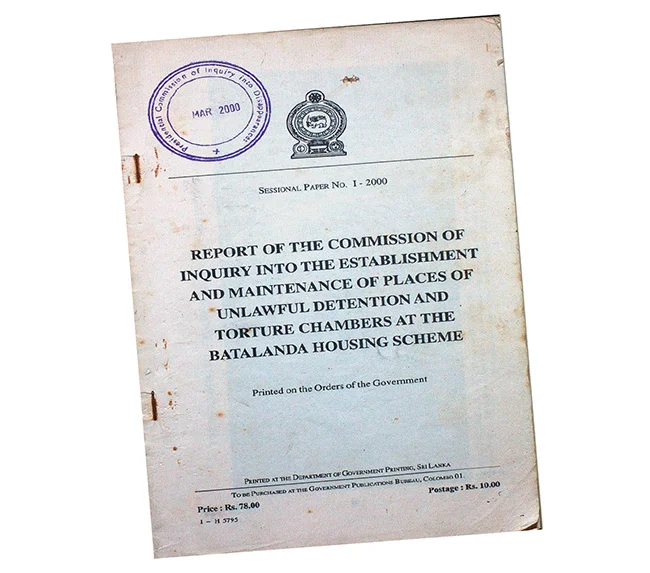
The sudden reemergence of two major incidents from the past, that had become peripheral to the concerns of people today, has jolted the national polity and come to its centre stage. These are the interview by former president Ranil Wickremesinghe with the Al Jazeera television station that elicited the Batalanda issue and now the sanctioning of three former military commanders of the Sri Lankan armed forces and an LTTE commander, who switched sides and joined the government. The key lesson that these two incidents give is that allegations of mass crimes, whether they arise nationally or internationally, have to be dealt with at some time or the other. If they are not, they continue to fester beneath the surface until they rise again in a most unexpected way and when they may be more difficult to deal with.
In the case of the Batalanda interrogation site, the sudden reemergence of issues that seemed buried in the past has given rise to conjecture. The Batalanda issue, which goes back 37 years, was never totally off the radar. But after the last of the commission reports of the JVP period had been published over two decades ago, this matter was no longer at the forefront of public consciousness. Most of those in the younger generations who were too young to know what happened at that time, or born afterwards, would scarcely have any idea of what happened at Batalanda. But once the issue of human rights violations surfaced on Al Jazeera television they have come to occupy centre stage. From the day the former president gave his fateful interview there are commentaries on it both in the mainstream media and on social media.
There seems to be a sustained effort to keep the issue alive. The issues of Batalanda provide good fodder to politicians who are campaigning for election at the forthcoming Local Government elections on May 6. It is notable that the publicity on what transpired at Batalanda provides a way in which the outcome of the forthcoming local government elections in the worst affected parts of the country may be swayed. The problem is that the main contesting political parties are liable to be accused of participation in the JVP insurrection or its suppression or both. This may account for the widening of the scope of the allegations to include other sites such as Matale.
POLITICAL IMPERATIVES
The emergence at this time of the human rights violations and war crimes that took place during the LTTE war have their own political reasons, though these are external. The pursuit of truth and accountability must be universal and free from political motivations. Justice cannot be applied selectively. While human rights violations and war crimes call for universal standards that are applicable to all including those being committed at this time in Gaza and Ukraine, political imperatives influence what is surfaced. The sanctioning of the four military commanders by the UK government has been justified by the UK government minister concerned as being the fulfilment of an election pledge that he had made to his constituents. It is notable that the countries at the forefront of justice for Sri Lanka have large Tamil Diasporas that act as vote banks. It usually takes long time to prosecute human rights violations internationally whether it be in South America or East Timor and diasporas have the staying power and resources to keep going on.
In its response to the sanctions placed on the military commanders, the government’s position is that such unilateral decisions by foreign government are not helpful and complicate the task of national reconciliation. It has faced criticism for its restrained response, with some expecting a more forceful rebuttal against the international community. However, the NPP government is not the first to have had to face such problems. The sanctioning of military commanders and even of former presidents has taken place during the periods of previous governments. One of the former commanders who has been sanctioned by the UK government at this time was also sanctioned by the US government in 2020. This was followed by the Canadian government which sanctioned two former presidents in 2023. Neither of the two governments in power at that time took visibly stronger stands.
In addition, resolutions on Sri Lanka have been a regular occurrence and have been passed over the Sri Lankan government’s opposition since 2012. Apart from the very first vote that took place in 2009 when the government promised to take necessary action to deal with the human rights violations of the past, and won that vote, the government has lost every succeeding vote with the margins of defeat becoming bigger and bigger. This process has now culminated in an evidence gathering unit being set up in Geneva to collect evidence of human rights violations in Sri Lanka that is on offer to international governments to use. This is not a safe situation for Sri Lankan leaders to be in as they can be taken before international courts in foreign countries. It is important for Sri Lanka’s sovereignty and dignity as a country that this trend comes to an end.
COMPREHENSIVE SOLUTION
A peaceful future for Sri Lanka requires a multi-dimensional approach that addresses the root causes of conflict while fostering reconciliation, justice, and inclusive development. So far the government’s response to the international pressures is to indicate that it will strengthen the internal mechanisms already in place like the Office on Missing Persons and in addition to set up a truth and reconciliation commission. The difficulty that the government will face is to obtain a national consensus behind this truth and reconciliation commission. Tamil parties and victims’ groups in particular have voiced scepticism about the value of this mechanism. They have seen commissions come and commissions go. Sinhalese nationalist parties are also highly critical of the need for such commissions. As the Nawaz Commission appointed to identify the recommendations of previous commissions observed, “Our island nation has had a surfeit of commissions. Many witnesses who testified before this commission narrated their disappointment of going before previous commissions and achieving nothing in return.”
Former minister Prof G L Peiris has written a detailed critique of the proposed truth and reconciliation law that the previous government prepared but did not present to parliament.
In his critique, Prof Peiris had drawn from the South African truth and reconciliation commission which is the best known and most thoroughly implemented one in the world. He points out that the South African commission had a mandate to cover the entire country and not only some parts of it like the Sri Lankan law proposes. The need for a Sri Lankan truth and reconciliation commission to cover the entire country and not only the north and east is clear in the reemergence of the Batalanda issue. Serious human rights violations have occurred in all parts of the country, and to those from all ethnic and religious communities, and not only in the north and east.
Dealing with the past can only be successful in the context of a “system change” in which there is mutual agreement about the future. The longer this is delayed, the more scepticism will grow among victims and the broader public about the government’s commitment to a solution. The important feature of the South African commission was that it was part of a larger political process aimed to build national consensus through a long and strenuous process of consultations. The ultimate goal of the South African reconciliation process was a comprehensive political settlement that included power-sharing between racial groups and accountability measures that facilitated healing for all sides. If Sri Lanka is to achieve genuine reconciliation, it is necessary to learn from these experiences and take decisive steps to address past injustices in a manner that fosters lasting national unity. A peaceful Sri Lanka is possible if the government, opposition and people commit to truth, justice and inclusivity.
by Jehan Perera
Features
Unleashing Minds: From oppression to liberation

 Education should be genuinely ‘free’—not just in the sense of being free from privatisation, but also in a way that empowers students by freeing them from oppressive structures. It should provide them with the knowledge and tools necessary to think critically, question the status quo, and ultimately liberate themselves from oppressive systems.
Education should be genuinely ‘free’—not just in the sense of being free from privatisation, but also in a way that empowers students by freeing them from oppressive structures. It should provide them with the knowledge and tools necessary to think critically, question the status quo, and ultimately liberate themselves from oppressive systems.
Education as an oppressive structure
Education should empower students to think critically, challenge oppression, and envision a more just and equal world. However, in its current state, education often operates as a mechanism of oppression rather than liberation. Instead of fostering independent thinking and change, the education system tends to reinforce the existing power dynamics and social hierarchies. It often upholds the status quo by teaching conformity and compliance rather than critical inquiry and transformation. This results in the reproduction of various inequalities, including economic, racial, and social disparities, further entrenching divisions within society. As a result, instead of being a force for personal and societal empowerment, education inadvertently perpetuates the very systems that contribute to injustice and inequality.
Education sustaining the class structure
Due to the widespread privatisation of education, the system continues to reinforce and sustain existing class structures. Private tuition centres, private schools, and institutions offering degree programmes for a fee all play a significant role in deepening the disparities between different social classes. These private entities often cater to the more affluent segments of society, granting them access to superior education and resources. In contrast, students from less privileged backgrounds are left with fewer opportunities and limited access to quality education, exacerbating the divide between the wealthy and the underprivileged. This growing gap in educational access not only limits social mobility but also perpetuates a cycle where the privileged continue to secure better opportunities while the less fortunate struggle to break free from the constraints of their socio-economic status.
Gender Oppression
Education subtly perpetuates gender oppression in society by reinforcing stereotypes, promoting gender insensitivity, and failing to create a gender-sensitive education system. And some of the policymakers do perpetuate this gender insensitive education by misinforming people. In a recent press conference, one of the former members of Parliament, Wimal Weerawansa, accused gender studies of spreading a ‘disease’ among students. In the year 2025, we are still hearing such absurdities discouraging gender studies. It is troubling and perplexing to hear such outdated and regressive views being voiced by public figures, particularly at a time when societies, worldwide, are increasingly embracing diversity and inclusion. These comments not only undermine the importance of gender studies as an academic field but also reinforce harmful stereotypes that marginalise individuals who do not fit into traditional gender roles. As we move forward in an era of greater social progress, such antiquated views only serve to hinder the ongoing work of fostering equality and understanding for all people, regardless of gender identity.
Students, whether in schools or universities, are often immersed in an educational discourse where gender is treated as something external, rather than an essential aspect of their everyday lives. In this framework, gender is framed as a concern primarily for “non-males,” which marginalises the broader societal impact of gender issues. This perspective fails to recognise that gender dynamics affect everyone, regardless of their gender identity, and that understanding and addressing gender inequality is crucial for all individuals in society.
A poignant example of this issue can be seen in the recent troubling case of sexual abuse involving a medical doctor. The public discussion surrounding the incident, particularly the media’s decision to disclose the victim’s confidential statement, is deeply concerning. This lack of respect for privacy and sensitivity highlights the pervasive disregard for gender issues in society.
What makes this situation even more alarming is that such media behaviour is not an isolated incident, but rather reflects a broader pattern in a society where gender sensitivity is often dismissed or ignored. In many circles, advocating for gender equality and sensitivity is stigmatised, and is even seen as a ‘disease’ or a disruptive force to the status quo. This attitude contributes to a culture where harmful gender stereotypes persist, and where important conversations about gender equity are sidelined or distorted. Ultimately, this reflects the deeper societal need for an education system that is more attuned to gender sensitivity, recognising its critical role in shaping the world students will inherit and navigate.
To break free from these gender hierarchies there should be, among other things, a gender sensitive education system, which does not limit gender studies to a semester or a mere subject.
Ragging
The inequality that persists in class and regional power structures (Colombo and non-Colombo division) creeps into universities. While ragging is popularly seen as an act of integrating freshers into the system, its roots lie in the deeply divided class and ethno-religious divisions within society.
In certain faculties, senior students may ask junior female students to wear certain fabrics typically worn at home (cheetta dresses) and braid their hair into two plaits, while male students are required to wear white, long-sleeved shirts without belts. Both men and women must wear bathroom slippers. These actions are framed as efforts to make everyone equal, free from class divisions. However, these gendered and ethicised practices stem from unequal and oppressive class structures in society and are gradually infiltrating university culture as mechanisms of oppression.The inequality that persists in gradually makes its way into academic institutions, particularly universities.
These practices are ostensibly intended to create a sense of uniformity and equality among students, removing visible markers of class distinction. However, what is overlooked is that these actions stem from deeply ingrained and unequal social structures that are inherently oppressive. Instead of fostering equality, they reinforce a system where hierarchical power dynamics in the society—rooted in class, gender, and region—are confronted with oppression and violence which is embedded in ragging, creating another system of oppression.
Uncritical Students
In Sri Lanka, and in many other countries across the region, it is common for university students to address their lecturers as ‘Sir’ and ‘Madam.’ This practice is not just a matter of politeness, but rather a reflection of deeply ingrained societal norms that date back to the feudal and colonial eras. The use of these titles reinforces a hierarchical structure within the educational system, where authority is unquestioned, and students are expected to show deference to their professors.
Historically, during colonial rule, the education system was structured around European models, which often emphasised rigid social distinctions and the authority of those in power. The titles ‘Sir’ and ‘Madam’ served to uphold this structure, positioning lecturers as figures of authority who were to be respected and rarely challenged. Even after the end of colonial rule, these practices continued to permeate the education system, becoming normalised as part of the culture.
This practice perpetuates a culture of obedience and respect for authority that discourages critical thinking and active questioning. In this context, students are conditioned to see their lecturers as figures of unquestionable authority, discouraging dialogue, dissent, or challenging the status quo. This hierarchical dynamic can limit intellectual growth and discourage students from engaging in open, critical discussions that could lead to progressive change within both academia and society at large.
Unleashing minds
The transformation of these structures lies in the hands of multiple parties, including academics, students, society, and policymakers. Policymakers must create and enforce policies that discourage the privatisation of education, ensure equal access for all students, regardless of class dynamics, gender, etc. Education should be regarded as a fundamental right, not a privilege available only to a select few. Such policies should also actively promote gender equality and inclusivity, addressing the barriers that prevent women, LGBTQ+ individuals, and other marginalised genders from accessing and succeeding in education. Practices that perpetuate gender inequality, such as sexism, discrimination, or gender-based violence, need to be addressed head-on. Institutions must prioritise gender studies and sensitivity training to cultivate an environment of respect and understanding, where all students, regardless of gender, feel safe and valued.
At the same time, the micro-ecosystems of hierarchy within institutions—such as maintaining outdated power structures and social divisions—must be thoroughly examined and challenged. Universities must foster environments where critical thinking, mutual respect, and inclusivity—across both class and gender—are prioritised. By creating spaces where all minds can flourish, free from the constraints of entrenched hierarchies, we can build a more equitable and intellectually vibrant educational system—one that truly unleashes the potential of all students, regardless of their social background.
(Anushka Kahandagamage is the General Secretary of the Colombo Institute for Human Sciences)
Kuppi is a politics and pedagogy happening on the margins of the lecture hall that parodies, subverts, and simultaneously reaffirms social hierarchies.
By Anushka Kahandagamage
Features
New vision for bassist Benjy
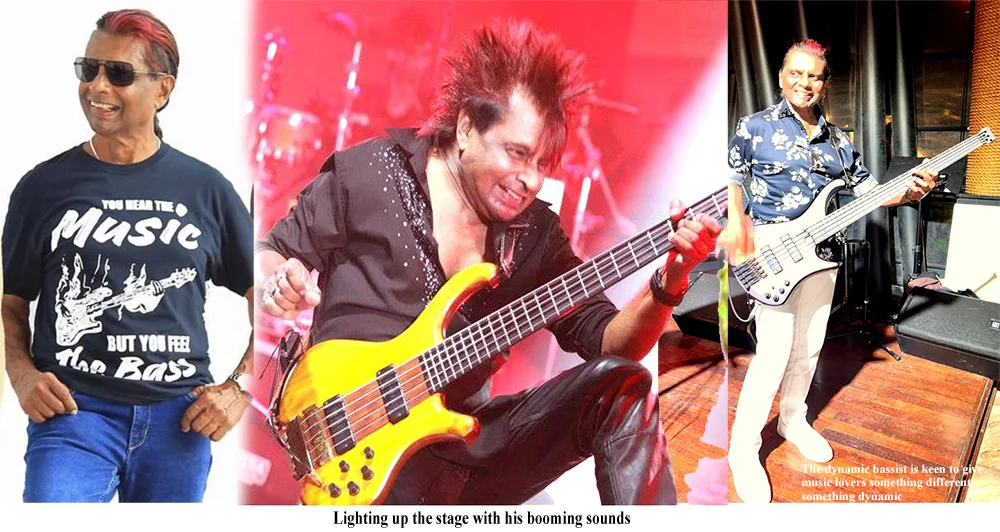
It’s a known fact that whenever bassist Benjy Ranabahu booms into action he literally lights up the stage, and the exciting news I have for music lovers, this week, is that Benjy is coming up with a new vision.
One thought that this exciting bassist may give the music scene a layoff, after his return from the Seychelles early this year.
At that point in time, he indicated to us that he hasn’t quit the music scene, but that he would like to take a break from the showbiz setup.
“I’m taking things easy at the moment…just need to relax and then decide what my future plans would be,” he said.
However, the good news is that Benjy’s future plans would materialise sooner than one thought.
Yes, Benjy is putting together his own band, with a vision to give music lovers something different, something dynamic.
He has already got the lineup to do the needful, he says, and the guys are now working on their repertoire.
The five-piece lineup will include lead, rhythm, bass, keyboards and drums and the plus factor, said Benjy, is that they all sing.
A female vocalist has also been added to this setup, said Benjy.
“She is relatively new to the scene, but with a trained voice, and that means we have something new to offer music lovers.”
The setup met last week and had a frank discussion on how they intend taking on the music scene and everyone seems excited to get on stage and do the needful, Benjy added.
Benjy went on to say that they are now spending their time rehearsing as they are very keen to gel as a team, because their skills and personalities fit together well.
“The guys I’ve got are all extremely talented and skillful in their profession and they have been around for quite a while, performing as professionals, both here and abroad.”
Benjy himself has performed with several top bands in the past and also had his own band – Aquarius.
Aquarius had quite a few foreign contracts, as well, performing in Europe and in the Middle East, and Benjy is now ready to do it again!
-

 Sports3 days ago
Sports3 days agoSri Lanka’s eternal search for the elusive all-rounder
-

 Features7 days ago
Features7 days agoCelebrating 25 Years of Excellence: The Silver Jubilee of SLIIT – PART I
-

 News4 days ago
News4 days agoGnanasara Thera urged to reveal masterminds behind Easter Sunday terror attacks
-

 Business7 days ago
Business7 days agoCEB calls for proposals to develop two 50MW wind farm facilities in Mullikulam
-

 Business5 days ago
Business5 days agoAIA Higher Education Scholarships Programme celebrating 30-year journey
-

 Features7 days ago
Features7 days agoNotes from AKD’s Textbook
-

 News3 days ago
News3 days agoComBank crowned Global Finance Best SME Bank in Sri Lanka for 3rd successive year
-

 Features3 days ago
Features3 days agoSanctions by The Unpunished


